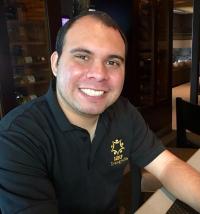Alexis R. Santos (Santos-Lozada)
Director, Morbidity, Mortality and Demography Lab
Core Area:
- Individual development - adult and aging
Research:
- Determinants and promotion of well-being
- Healthy aging
- Influences of stress on development and aging
- Socio-cultural and economic diversity
- Demography
- 2021-2023, Investigator, Interdisciplinary Network for Rural Health and Aging
- 2015-2018, Director of Graduate Studies in Applied Demography, Pennsylvania State University
- 2015-2017, Postdoctoral Research Fellow, USAIR, Fort Sam Houston, Texas
Enhancing our understanding of minority health. My first area of research focuses on leveraging self-reports and biomarkers to increase our understanding of minority health. To accomplish this, I have used cardiovascular, metabolic and inflammation biomarker-based measures and have found: (1) that biological risk profiles do not correspond to self-reported health as strongly among adults from racially/ethnically minoritized backgrounds as they do for non-Hispanic white adults; (2) that the pace of immigrant health deterioration found in self-reported health and mortality extends to biomarker-based measures; (3) that measures of inflammation or immunological response are equally associated with social support and mental health; and (4) that different operationalizations of physiological dysregulation leads to a better understanding of racial and ethnic disparities in health status.
Heterogeneity in social disparities in health and mortality. My second area of research deals with understanding heterogeneity in disparities by examining the individual experiences of racially/ethnically minoritized populations. In the US, the monitoring of health metrics has largely focused on national or state trends. These patterns are assumed to reflect the lived experiences of all the people. I interrogate whether this assumption is true when investigating the individual differences among racially/ethnically minoritized groups. This work was supported by the NIA-funded Interdisciplinary Network on Rural Population Health and Aging (2021-2023) and ongoing work is being funded by my NIA R21 (2023-2025).
Demographic change and policy implications. My third area of research targets demographic change and policy. I have launched two projects that leverage census data to study demographic transformations. The first project evaluates the accuracy of U.S. census tabulations on which the nation relies to understand population composition. Ongoing work is funded through my NICHD R03 (2022-2024). A Pilot Grant from the NIA-funded Network on Life Course Health Dynamics and Disparities is also funding work from this line of inquiry.
- Rhubart, Danielle C. and Santos-Lozada, Alexis R. (2023) Research Note showing the Rural Mortality Penalty varies by Region and Race/Ethnicity in the United States, 1999-2016. Demography.
- Santos-Lozada, Alexis R., Howard, Jeffrey T., Monnat, Shannon, Sliwinski, Martin J., Jensen, Leif. 2023. Age differences in Allostatic Load among adults in the United States by rural-urban residence. SSM-Population Health.
- Santos-Lozada, Alexis R. (2023). Trends in deaths from falls among adults 65 years and older in the United States, 1999-2020. Journal of the American Medical Association, 329(18), pp. 1605-1607.
- Ye, Leafia Zi and Santos-Lozada, Alexis R. (2022) U. S. Immigrants Have Highly Heterogeneous Perceptions of How Selected They Are on Health. Socius.
Mentoring
I am actively involved in mentorship of graduate students and postdoctoral fellows. I meet with my mentees at least once a week for one hour. In these meetings we revisit the progress from the past week, address any element that may be halting progress, and set the plan for current week. Mentees should send me any product for feedback two days before our meeting. On instances where the Mentee requires coding or statistics support, I do my best to review their code and provide guidance. For requests that are beyond my understanding, I will refer them to institutional resources such as QuantDev to deal with their programming needs.
Within my lab, I apply elements of each of the five main mentorship styles. Connecting: I will help you identify areas for growth and will alert you to opportunities available within Penn State and elsewhere that are in line with your goals. Challenging: I will foster your growth through readings, assignments, and providing mentorship as required. I will be supportive and friendly, but you will be responsible to keep the work on track. Educating: I will, to the best of my ability, teach you about the research process, life and expectations of academics, to assure you become an independent scholar. I will help you identify your strengths and areas for improvement, and together we will work on your professional development. Cheerleading: My default setting is to inject positive energy on my mentees. Even when my mentee faces a challenging situation, I will help them identify the positive aspect of the situation. This does not precludes us from having a serious and respectful mentor-mentee relationship. Ideating: I am always happy to meet with mentees and brainstorm about research ideas. I will also help them develop their ideas, suggest readings, and to think about the population-level or translational aspects of their research projects.
I foster a connection with students by caring about their needs, plans and well-being. I am always happy to go for a walk, coffee/tea meeting or lunch to discuss any situations or concerns.

